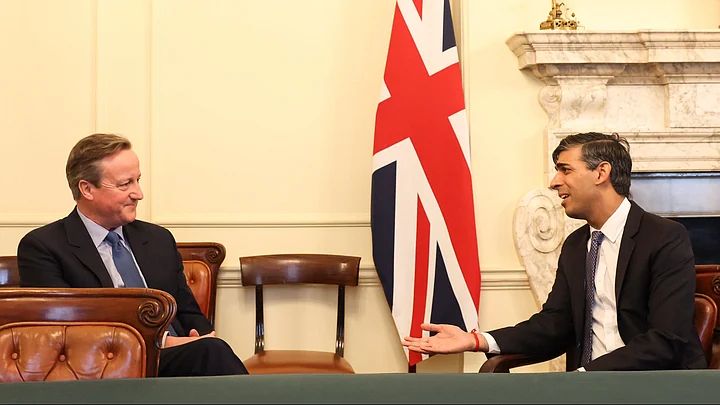Former prime minister David Cameron’s return as foreign secretary in Rishi Sunak’s government was surprising, to say the least. Only four former prime ministers have gone on to serve again in government, and none since Alec Douglas-Home returned as foreign secretary under Edward Heath in 1970.
Sunak surely has more in mind than some shocked headlines, but working out the strategic thinking behind the move is perplexing for two reasons. First because Cameron is not a particularly popular politician. Second because, even setting that aside, he is the wrong kind of person to bring back to serve the Conservative strategy that has the best chance of working at the next general election.
It is difficult to pin down how the public felt about Cameron just prior to his resignation in 2016, because there was such a febrile atmosphere at the time. The Brexit referendum, in which Cameron was one of the faces of the Remain campaign, coloured everything.
However, we know that a few months before the referendum he had worse favourability ratings than Jeremy Corbyn, Labour leader of the time (–24 to –22 net favourability).
Expert surveys also concluded at the time that Cameron was among the worst post-war prime ministers, below even the crisis-stricken Gordon Brown and Heath. More to the point, when asked about his return as foreign secretary, just 24% of the public believe it was a good decision.
Surely a lot of this is down to Brexit. Half the country opposed it and Cameron was the prime minister who made it (and the years of post-Brexit tumult) happen.
It was Cameron who called the referendum in the first place and Cameron who failed to convince voters to back Remain. Boris Johnson (another Cincinnatus-in-waiting) would face similar obstacles if he were to return, but at least he would go down better with many Leave supporters.
Looking at other aspects of Cameron’s legacy, the picture is hardly any rosier. The Cameron years were not boom times. They were an “age of austerity” marked by spending cuts, stagnant wages, flatlining productivity and an economy that barely grew.
The merits of fiscal retrenchment in the wake of a financial crisis can be debated. But even judged on its own terms – the goal of eliminating the deficit within a single parliament – the Cameron government’s austerity package failed.
The centrepiece for Cameron’s vision for the country, his “big society” policy, has barely left a trace. This was meant to fix “broken Britain”, but what legacy is there to claim when with around 5 million people on out-of-work benefits and with COVID having exposed the dire state of so many of Britain’s public services?
Choosing The Blue Wall Over The Red Wall?
When considered in relation to what is presumably still the Conservative strategy going in to the next general election, it makes just as little sense.
The now-ousted Suella Braverman was a prominent Conservative culture warrior but Sunak has hardly shied away from campaigning along these lines himself. His clear intention to harness resentment over climate change policies as an electoral strategy is a case in point.
However, Cameron’s appointment sends mixed messages in this regard because, as PM, Cameron had a very prominent green agenda and embraced the commitment to reduce the UK’s emissions by 80% (relative to 1990 levels) by 2050.
Sunak needs to appeal to working-class voters in red wall seats in the north of England – the constituents won over by Boris Johnson in 2019. But Cameron is a classic home counties Tory, precisely the kind of politician deemed out of touch in the Brexit years.
Perceptions of his elitism were only reinforced by revelations that he personally texted Sunak when he was chancellor to lobby for the finance company Greensill Capital to gain access to a Bank of England COVID loan scheme.
Cameron’s appointment also jars with Sunak’s recent Conservative conference speech, in which he attempted to distance himself from a failed “30-year political status quo” and criticised a system characterised by vested interests. This presumably encompasses his new foreign secretary’s time as prime minister.
Which begs the question: what is in this for Sunak? Cameron will bring considerable experience to his new role in government, and he is a capable media performer. Both these traits are in high demand after the attrition in cabinet in recent years, but they are hardly game-changers.
His appointment may also help shore up Conservative support in a handful of marginals in southern England. But at what cost in other parts of the country?
Perhaps the biggest single benefit of the move is that it instantly shifted the focus away from Braverman and limited the amount of mischief she could make in the aftermath of her departure, but even that does very little to help Sunak beyond the very short term.
It’s doubtful that pulling any rabbit out of the hat could change the likelihood of a big Conservative loss at the next general election, but if there is one, this almost certainly isn’t it.
(This is an opinion piece and the views expressed above are the author’s own. The Quint neither endorses nor is responsible for the same. This article was originally published on The Conversation. Read the original article here.)
